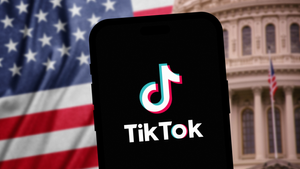The speaker of the US House Of Representatives, Mike Johnson, has included the TikTok-targeting sell-or-be-banned law in a big new bill that also includes aid for Ukraine and Israel. It’s a move that could result in the US Senate endorsing a TikTok ban much sooner than originally expected, although this version of the proposed new law would give China-based owner ByteDance more time to sell the app.
Needless to say, TikTok is not impressed. A spokesperson says, “It is unfortunate that the House Of Representatives is using the cover of important foreign and humanitarian assistance to once again jam through a ban bill that would trample the free speech rights of 170 million Americans, devastate seven million businesses, and shutter a platform that contributes $24 billion to the US economy, annually”.
The House Of Representatives has already passed the proposed sell-or-be-banned law, which gives ByteDance six months to sell TikTok or face a ban in the US. The measure is a response to concerns that the Chinese government has access to TikTok user data via ByteDance.
TikTok has always denied all the concerns about data security, while also talking up Project Texas, its alliance with American tech company Oracle, which has put in place measures to ensure that all US user data is stored on servers within the US, and that it never leaves the country.
However, there have been various media reports that suggest Congress members are right to be concerned about what happens to TikTok user data, claiming that - at the very least - data about American users can still end up with ByteDance employees in China. And that includes a new article published by Fortune which cites a number of former employees who claim that Project Texas is “largely cosmetic”.
One of those ex-TikTok team members claims that, while his line manager was in the US, he still really reported to ByteDance execs in Beijing. As well as that, every two or three weeks he would email spreadsheets full of US user data to his colleagues in China who were working on evolving the TikTok algorithm.
Responding to the Fortune article on X, TikTok says that the people interviewed in it are talking about systems that were in place prior to Project Taxes going into effect. Nevertheless, articles like this will only add to the momentum in Congress for some kind of TikTok law to be passed.
The sell-or-be-banned proposals were fast-tracked in the House and already have the support of US President Joe Biden. However, they also need to be voted on by the Senate.
There is definite support for the proposals in the upper house of US Congress, though it is generally thought that the new law will face much more scrutiny there. Senate Majority Leader Chuck Schumer has already confirmed that the proposals will be considered, but hasn't yet committed to a timeline.
Some senators have expressed concern that the proposals breach First Amendment free speech rights and will therefore falter in the courts. Others have also said that a six month deadline to negotiate and complete a sale is unrealistic.
The new version of the proposed ban that is included alongside the aid packages deals with that particular concern by providing up to a year for any sale to be completed; basically 270 days with the option for the President to extend the deadline by another 90 days.
Senator Maria Cantwell, chair of the Senate Commerce Committee which has been considering the proposals, noted that fact in a statement, saying, “I’m very happy that Speaker Johnson and House leaders incorporated my recommendation to extend the ByteDance divestment period from six months to a year. Extending the divestment period is necessary to ensure there is enough time for a new buyer to get a deal done”.
Given the urgency of the aid packages for Ukraine and Israel, this new bill should get speedy consideration in the Senate if it is passed by the House this weekend. Hence why it potentially speeds up the TikTok ban getting Senate approval. Though even if it is passed by both chambers of Congress, it is likely court action could further delay the deadline for any forced sale.

